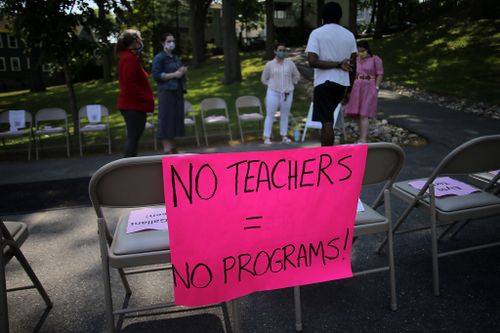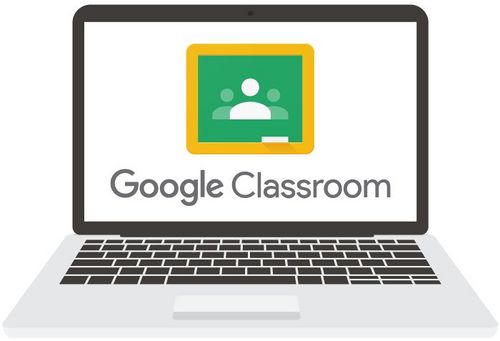Former Teacher (Gurleen): Difference between revisions
Gurleeng77 (talk | contribs) No edit summary |
No edit summary |
||
| Line 1: | Line 1: | ||
[[File:WhatsApp Image 2023-11-30 at 11.27.18.jpg|500px|thumb|right|alt=Existential loss of education, because there is a lack of knowledge production between student and teacher.|Existential loss of education, because there is a lack of knowledge production between student and teacher.]] | |||
The classroom of Ontario 2032 looks different for every student as they complete their schooling from the comfort and safety of their own home. Students approach experiential learning as text-based learning, simulated experiential learning like science labs, virtual reality field trips, and proctored exams are all conducted from a student’s home. Researchers studying Ontario’s Radical Education System have linked the lack of social interaction in youth to a drastic increase in anxiety disorders, mental health diagnoses, and general social difficulty in the province. Studies have also shown that the general confidence levels of people under the age of 18 have lowered in comparison to previous years, due to a lack of socialisation in the in-person school setting. The success of students’ academic achievement is connected with social groups, clubs, and friendships for healthy social and emotional development. | The classroom of Ontario 2032 looks different for every student as they complete their schooling from the comfort and safety of their own home. Students approach experiential learning as text-based learning, simulated experiential learning like science labs, virtual reality field trips, and proctored exams are all conducted from a student’s home. Researchers studying Ontario’s Radical Education System have linked the lack of social interaction in youth to a drastic increase in anxiety disorders, mental health diagnoses, and general social difficulty in the province. Studies have also shown that the general confidence levels of people under the age of 18 have lowered in comparison to previous years, due to a lack of socialisation in the in-person school setting. The success of students’ academic achievement is connected with social groups, clubs, and friendships for healthy social and emotional development. | ||
The transition from in-person to online learning severed peer relationships among youth, causing increased feelings of competitiveness through high marks. Based on these findings, critics of the Fairfield Education System have concluded that the Ontario student body of 2032 has become distant, faceless, and disconnected as a result of this new method of schooling. Some students are losing interest in their education, others are struggling to understand difficult concepts, while others simply are not attending the virtual class sessions. | The transition from in-person to online learning severed peer relationships among youth, causing increased feelings of competitiveness through high marks. Based on these findings, critics of the Fairfield Education System have concluded that the Ontario student body of 2032 has become distant, faceless, and disconnected as a result of this new method of schooling. Some students are losing interest in their education, others are struggling to understand difficult concepts, while others simply are not attending the virtual class sessions. | ||
| Line 5: | Line 6: | ||
Shakespeare is not being critiqued, as students from diverse backgrounds are drawing from their social and political issues, willing to explore their cultural stories, and are researching about their personal, social, and political History, with the fear of losing their cultural identity. Online platforms serve as communities for students, allowing students to engage in stories through Netflix and Youtube, take part in local Art Museum exhibitions, and research languages in the place of the digital world. | Shakespeare is not being critiqued, as students from diverse backgrounds are drawing from their social and political issues, willing to explore their cultural stories, and are researching about their personal, social, and political History, with the fear of losing their cultural identity. Online platforms serve as communities for students, allowing students to engage in stories through Netflix and Youtube, take part in local Art Museum exhibitions, and research languages in the place of the digital world. | ||
Interestingly, teachers are also finding it difficult to accommodate students of various intelligences. Classrooms for Regional Programs, such as the Regional Art Program, Specialist High School Major, International Baccalaureate, Advanced Placement, and Extended French Immersion find that students are struggling to understand difficult and advanced concepts, which leads to a lowered performance on standardised tests. Students are using private schools to boost their marks and find admission into University. Neurologically diverse students feel excluded from regional program schooling, as the classroom is designed for marks, instead of creative assignments, learning, and conferences. Neurologically diverse students find their education to be accessible, finding more independence in navigating through life. Teachers are facing the pressure of providing quality education, meeting the strands of the curriculum and teaching in multimodal ways to reach each student. Education needs a deep thought among educational researchers, educators, and policymakers in Ontario. | Interestingly, teachers are also finding it difficult to accommodate students of various intelligences. Classrooms for Regional Programs, such as the Regional Art Program, Specialist High School Major, International Baccalaureate, Advanced Placement, and Extended French Immersion find that students are struggling to understand difficult and advanced concepts, which leads to a lowered performance on standardised tests. Students are using private schools to boost their marks and find admission into University. Neurologically diverse students feel excluded from regional program schooling, as the classroom is designed for marks, instead of creative assignments, learning, and conferences. Neurologically diverse students find their education to be accessible, finding more independence in navigating through life. Teachers are facing the pressure of providing quality education, meeting the strands of the curriculum and teaching in multimodal ways to reach each student. Education needs a deep thought among educational researchers, educators, and policymakers in Ontario. | ||
[[File:WhatsApp Image 2023-11-30 at 11.27.05.jpg|500px|thumb|right|alt=Virtual Learning Space, where Students are Learning from Artificial Intelligence.|Virtual Learning Space, where Students are Learning from Artificial Intelligence.]] | |||
Revision as of 08:37, 30 November 2023
The classroom of Ontario 2032 looks different for every student as they complete their schooling from the comfort and safety of their own home. Students approach experiential learning as text-based learning, simulated experiential learning like science labs, virtual reality field trips, and proctored exams are all conducted from a student’s home. Researchers studying Ontario’s Radical Education System have linked the lack of social interaction in youth to a drastic increase in anxiety disorders, mental health diagnoses, and general social difficulty in the province. Studies have also shown that the general confidence levels of people under the age of 18 have lowered in comparison to previous years, due to a lack of socialisation in the in-person school setting. The success of students’ academic achievement is connected with social groups, clubs, and friendships for healthy social and emotional development.
The transition from in-person to online learning severed peer relationships among youth, causing increased feelings of competitiveness through high marks. Based on these findings, critics of the Fairfield Education System have concluded that the Ontario student body of 2032 has become distant, faceless, and disconnected as a result of this new method of schooling. Some students are losing interest in their education, others are struggling to understand difficult concepts, while others simply are not attending the virtual class sessions.
With students struggling with academic interest in the Ontario Education system, the literacy rates of students have been severely impacted. Students are constantly using digital tools to complete written assignments, such as: autocorrect, ChatGPT, and online student companies that prepare assignments for students. Teachers are now using another machine tool, AssignmentCheck, to verify the authenticity of students’ work, with live conferences to assess student learning. With classrooms being online, students taking Math and Science are not performing well on formative and summative assessments, as teachers cannot clearly teach difficult concepts in an online format, translating science laboratories in an online format, and students find it difficult to relate abstract concepts to real life without creating live conditions for Science scenarios. Courses in the Humanities and Arts are not facing much turbulence, as students are engaging with stories, social, and political issues as a form of catharsis to escape their reality. Shakespeare is not being critiqued, as students from diverse backgrounds are drawing from their social and political issues, willing to explore their cultural stories, and are researching about their personal, social, and political History, with the fear of losing their cultural identity. Online platforms serve as communities for students, allowing students to engage in stories through Netflix and Youtube, take part in local Art Museum exhibitions, and research languages in the place of the digital world. Interestingly, teachers are also finding it difficult to accommodate students of various intelligences. Classrooms for Regional Programs, such as the Regional Art Program, Specialist High School Major, International Baccalaureate, Advanced Placement, and Extended French Immersion find that students are struggling to understand difficult and advanced concepts, which leads to a lowered performance on standardised tests. Students are using private schools to boost their marks and find admission into University. Neurologically diverse students feel excluded from regional program schooling, as the classroom is designed for marks, instead of creative assignments, learning, and conferences. Neurologically diverse students find their education to be accessible, finding more independence in navigating through life. Teachers are facing the pressure of providing quality education, meeting the strands of the curriculum and teaching in multimodal ways to reach each student. Education needs a deep thought among educational researchers, educators, and policymakers in Ontario.

